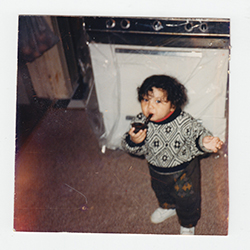Melencolia’s Samsara
after Albrecht Dürer’s Melencolia I, 1514
I remember when I was beautiful. I was observed obsessively. My body was an open canvas. My mind was full. I remembered my sisters—their glistening beams of light and the violence they endured. Away from Albrecht, away from the infant, away from the dog—I met with a Boddhisatva. I wished to be empty.
On the day I swallowed the sun, there was a man standing on a hill. He had masturbated to my hips as I began to collapse. The struggle of brushstrokes felt much calmer than these physical pains. When samsara continued, I unraveled the man. My fingers in his core, spinning with the splendor of a pulsar.
When the world went dark, I became the sun. My warmth covered the rapists and the indignant. Hubristic murderers infiltrated my reach. My sides became everlasting highways and so, I covered the rapists and the murderers, and the lovers separated by picnic baskets in late spring where I was expected to be. My expectations outgrew me. I tried my best.
I kissed everyone, the unable and the diseased, the imperfect Adonises and their gender fluid queens. I felt children reaching out for me, small breaths grasping my hued abstractions. When mountain goats kissed the lamb, I began to feel tired. The weight of infinite needs drove down my sides and bit away at my color, I wanted to weep but the form was steam.
Boddhi talked of purpose and place but I, I felt an overwhelming frustration. As if my core was swallowing itself, I wanted nothing to do with form. Samsara continued and I burned the rings of Saturn, locked in intercourse with planetoidal debris. I wept as our bodies entangled, forming spherical vines lit by nameless dead stars. I am tired of the cycles.
When I was beautiful, I wished to live beyond Albrecht Dürer’s Melencolia I. When I walked outside, I found nothing of beauty. I saw the eyes of men and I wanted to save my sisters, to shield them from millennia of responsibility. I became the sun and as the days went, my light turned to decay. Every second was agonizing. Every second was natural. When I returned to the engraving, I was a nameless Venus. My body unrecognizable, my beauty substantial, and my presence—a suffering.
Scorched
If the Earth beneath my feet begins to singe my calloused heels well then let me sing
a song for my students who write poems about dogs and gods and the sun—death!
How beautiful! All of everything can be, I tell myself for my friend with the father
who is dying in a hospital bed, his hands—calloused from the marble tiles he broke
his back laying as if an obsession—a necessity of labor. How beautiful! The open
mouth of the wolf perched on a cliff near the woods where I smoked dirt weed not far
from the motel where politicians met their mistresses, and I bought dirt weed with my brother
who swore his brother would get his shit together. How beautiful! The glare of the sun
on my dashboard where the CD player stalled, and my Mars Volta CD has been swallowed
whole like the open mouth that swallowed compact disc technology whole in the awakening
of spirit that Hegel droned on about. How beautiful! Marx’s little red book in the hands of
the angelic Kahlo—abused repeatedly by a man who excused everything for art’s sake. How beautiful! I live
in a country where God would have made his way into my pants had I not had to bow during the
sacraments. How beautiful! That ethereal church with the shapes the procession made—the priest’s
voice when he told me to get out of the confessional for I—I was not blessed to be. My small hands
flipped through that Bible a hundred times trying to make sense of any of those endless lines.
How beautiful! The angst of reading Dostoyevsky at a bus stop. Dreaming of boys while sleeping
with girls—pushing the boundaries of my body with sharp objects and substances. How beautiful!
The pack of Marlboro Red 100s in my back pocket, crushed with two “Lucky’s” in the front.
A navy-man told me, “One for good luck, one for a good fuck”—oh! How—I feel
the color lilac beneath my flesh between my bones and oh, there’s a brooding beast inside me.
Crushing up powders and minerals and feeding off everything. How beautiful! How beautiful.

Eros Livieratos (He/They) is a Greek-Belizean writer & artist whose work focuses on the intersection of identity, aesthetics, and capital in the Anthropocene. Eros has published poetry, fiction, non-fiction, comics, photography, and film score work. They can usually be found making harsh noise & screaming in your local basement.

